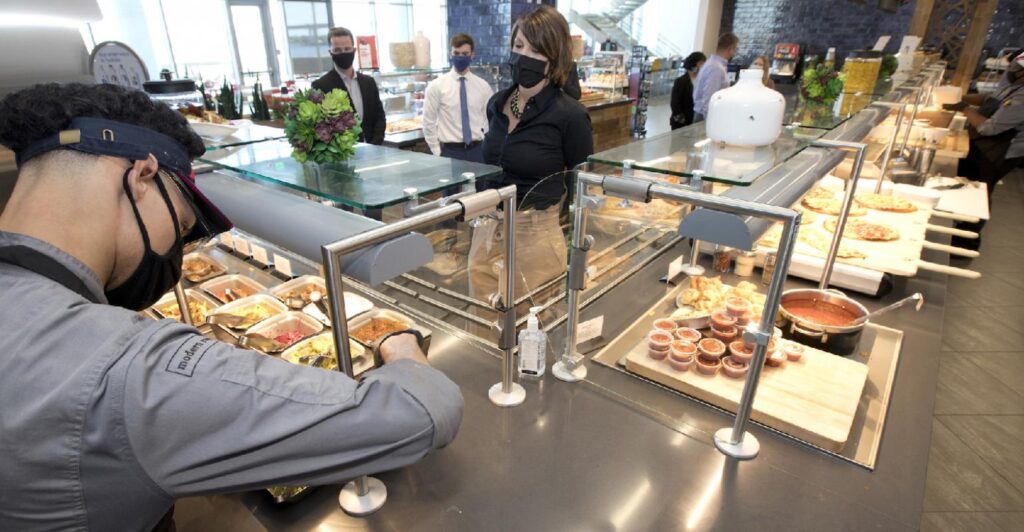
Food allergies are often overlooked in healthcare settings, despite the increasing number of people with food allergies. Around 32 million people¹ in the United States have food allergies, and the prevalence of food allergies in children has increased by 50% between 1997 and 2011.
Yearly, around 200,000 people² require emergency medical care for allergic reactions to food. The risk of food mishandling and subsequent allergic reactions in a healthcare setting can be huge and potentially detrimental. Suppose your food service staff is not trained in handling food allergies, or your clinical team is not documenting allergens properly. In that case, a patient’s food allergy can go undisclosed and undetected, leading to a potential worst-case scenario.
A person could be admitted to the hospital for any medical issues and expect to receive the best possible patient care they can get. However, they do not usually expect treatment for an issue created by the facility due to negligence.

Imagine a scenario where a patient has been diagnosed with a respiratory disease (i.e., COPD). They come into your facility with acute exacerbation of their condition. They expect to stay for about 3-5 days, pending improvement of their oxygen levels. Unfortunately, they also have a life-threatening allergy to peanuts, which nursing staff did not ask about upon admission, and no allergy was recorded in the medical record. The patient is served a lunch meal of a turkey sandwich prepared on the same counter as a peanut butter sandwich for another patient.
The food service staff was uninformed of the patient’s allergy due to a lack of documentation on the clinical side. However, even if the proper documentation had informed them, this mistake could have still been made without adequate food allergy training. As a result, the patient goes into anaphylaxis and is treated with epinephrine. Unfortunately, this preventable incident worsens the patient’s overall outcome and increases the length of stay by another three days.
Photo by: Neighborfood Blog
This particular situation could have been handled better in many ways. The nurse assigned to care for the patient would have been the first line of defense in getting the complete picture of the patient’s past medical history and easily would have discovered the peanut allergy. If the facility prioritized this through their standards of care, this would have been described in a procedure regarding initial patient assessment upon admission.
The patient’s diet order would have been documented in the medical record to include this allergy. If the food service department was informed before the patient ordered and received a meal, and the staff was adequately trained in dealing with food allergies, there would be no risk for cross-contact in the first place. The sandwich could have easily been made before other allergen foods and sent to the patient with an indication of the known allergy.
While situations like this are rare, they are not impossible, especially when there is a lack of training regarding handling food allergies. There is limited research on the subject of hospital-acquired anaphylaxis. Therefore, not only is this likely underreported but there is not always a transparent prevention system against food allergic reactions in every healthcare facility.

Reading “increased length of stay” should be a red flag to all of those in healthcare. Why?
This means increased cost on the patient end and a clear sign of lack of efficiency in multiple areas of patient care. In the case of a “surprise” allergic reaction during admission, the hospital has to treat the initial condition that brought the patient in and the response. The patient’s bill then skyrockets with just one more unexpected day in the hospital and even more medications and procedures to treat the incident.
A patient will likely not go back to the same hospital where they had an allergic reaction. As a result, patient satisfaction can decrease quickly and create a domino effect, where even the hospital’s reputation can suffer once word gets out about the incident. And, if the issue is bad enough, legal problems are not entirely out of the question.
Healthcare truly is a customer service-focused business. Providing for a customer or a patient is about ensuring that all facets of care are sound from admission up until discharge. Food allergies are included in this and should never be a second thought in healthcare settings, considering how many people have allergies and how often allergies send people to the hospital in the first place.
So, what steps can be taken to increase your facility’s proficiency in handling food allergies? This is something that will be discussed more in-depth on MenuTrinfo’s blog, but here are some concepts to think about:
- Consider introducing an allergy training program to your facility for the food service department and other clinical departments
- Consider starting an interdepartmental food allergy committee within your facility
- Consider developing more rigorous policies and procedures regarding handling food allergies and food allergy training
- Consider how registered dietitians are utilized in a facility regarding assessing patients with food allergies
Sources:[1] [2]
¹Gupta RS, Warren CM, Smith BM, Jiang J, Blumenstock JA, Davis MM, Schleimer RP, Nadeau KC. Prevalence and Severity of Food Allergies Among US Adults. JAMA Network Open 2019;
2(1):e185630.doi:10.1001/jamanetworkopen.2018.5630.
²Clark S, Espinola J, Rudders SA, Banerji, A, Camargo CA. Frequency of US emergency department visits for food-related acute allergic reactions. J Allergy Clin Immunol. 2011; 127(3):682-683.
About MenuTrinfo®:
MenuTrinfo® is a company dedicated to ensuring safe food service by providing allergen and nutritional information, as well as programs such as Certified Free From™, AllerTrain® and a wide variety of services for colleges, universities, manufacturers of consumer-packaged goods, and more. We excel in employee food allergy training and certification, as well as food safety guidance and menu consulting. MenuTrinfo® has become a trusted partner for food service partners and manufacturers across the United States, and the company’s mission is to protect lives and make dining experiences as safe as possible for those with allergy restrictions.



